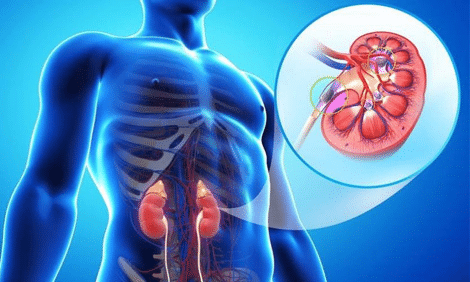
Chronic Kidney Disease: If the kidney of an individual is degrading slowly in a progressive manner or unable to function as effectively as it was before since several years then we call it as Chronic Kidney Disease (CKD), Chronic Renal Disease, chronic renal failure or chronic kidney disease. It seems more dangerous as it goes undetected and undiagnosed until the damage occurs such that it functions only 25% of the normal kidney.
SIGNS AND SYMPTOMS
- Anaemia
- Haematuria (blood in urine)
- dark urine
- Frequent urination
- oedema – swollen feet, handsds, and ankles (face if severe)
- tiredness
- high blood pressure
- insomnia
- Pruritus-itchy skin, can become persistent
- loss of appetite
- erectile dysfunction
- more frequent urination, especially at night
- muscle cramps and twitches
- Bone disease
- nausea
- pain on the side or mid to lower back
- Shortness of breath
- Proteinuria especially albumin
- uraemia symptoms- nausea, vomiting, constipation andskin discoloration.
- Restless legs
- Neurological changes- difficulty in concentrating, irritability, stupor.
- Electrolyte disturbances.
CAUSES OF CKD:
- hereditary– 5% of all CKD cases are inherited and make up o a higher proportion of end stage renal disease cases.
- Ischemic nephropathy– renal artery stenosis may cause the kidney to remain under perfusion causing interstitial fibrosis.
- Hypertensive renal disease–hypertension may cause atherosclerosis which can cause small vessel damage and occlusive endovascular disease.
- Metabolic diseases– diabetic nephropathy accounts for around 13% of CKD. These patients are at high risk of cardiovascular damage by virtue of both CKD and diabetes.
- Chronic glomerulonephritis– it comprises 15% of cases of advanced CKD. Most commonly IgA nephropathy.
- Lower urinary tract disease– they represent 5-10% of all cases of CKD. Conditions include reflux disease, kidney stones, chronic urinary tract infection and prostatic hypertrophy.
- Unknown cause– In 30% of cases,patient who presented with small kidneys and featureless immunological analyses are found to be of unknown cause.
HOW TO DIAGNOSE?
Although diagnosis may be suspected because of signs and symptoms, family history, drug and social history since genetics or exposure of toxins including herbal, OTC and prescription drugs can be implicated.
- Functional examination of the kidney may be performed by testing serum and urine showing elevation in serum creatinine levels, potassium, phosphates and acidosis along with decline in levels of calcium and bicarbonates.
- Complete urine examination along with dipstick test may be performed.
- Structural assessment of the kidney may be done by using imaging procedures including ultrasonography, computed tomography (CT), MRI scan, and intravenousurography and plainabdominalradiography.
- Even renalbiopsy may be performed, if imaging technique fails.
Chronic Kidney Disease Stages |
STAGES OF CKD:-
Based on the severity and extent of damage marked by the levels of GFR (Glomerular Filtration Rate)
| Stage 1 | Kidney disease detected | Normal GFR or >90 ml/min |
| Stage 2 | Kidney disease detected | GFR mild reduction
60-89 ml/min |
| Stage 3 | With or another kidney disease their kidney disease | Mild Moderate decrease
45-59ml/min in stage 3a and moderate severe decrease of 30-44ml/min in stage 3b. |
| Stage 4 | Significant Kidney damage | Severe reduction 13-29ml/min |
| Stage 5 | Renal failure | <15 ml/min |
COMPLICATIONS ASSOCIATED WITH CKD:
It’s so apparent that the individual with CKD seems to die due to cardiovascular disease than to renal failure.
According to recent studies held in Ludwig Maximillian’s University of Germany, accelerated cardiovascular diseases are found to be a major complication of chronic kidney disease i.e. increase risk of hypertension, dyslipidaemia, atherosclerosis which leads to increased prevalence of coronary artery disease, heart failure, stroke, peripheral arterial disease and ultimately vascular injury at the end-stage renal disease.
End-stage renal disease is a point at which life can only be attained by either dialysis or transplantation.
Chronic Kidney Disease TREATMENT:
Symptomatic treatment are done usually by avoiding the conditions that might worsen the renal damage and secondary complications of CKD like renal anaemia and bone disease are treated through medications.
Kidney Disease Diet:
DIETARY MODIFICATIONS IN CKD:
- Low protein diet-Fruits, Vegetables, Grains such as Rice, oats, bread, pasta, barley, etc. And healthy fats including avocados, olive oil and coconut oil.
- Sodium restriction– it can be reduced to satisfactory level of 18gm/day.
- Potassium restricted diet– avoid potassium rich foods like fruit and fruit drinks, vegetables, chocolate, beer, instant coffee and ice cream.
- Fluid restriction– mainly during oedema, daily fluid intake should be restricted to 1-3 litres, depending on patient urine output. Fluid allowance may be ingested in any form like fruits, soups, medicines. However fluid restriction is difficult to maintain, sucking ice cubes may relieve unpleasantly dry mouth but patient should not swallow the melted water.
